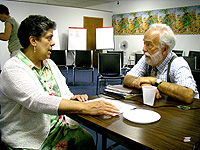Social Determinants of Health and Mental Health: Why Not? May 24, 2012
Posted by tomwolff in : Coalition Building, Collaborative Solutions , trackbackThe concept of Social Determinants of Health (SDOH) is widely used and accepted as a way of understanding health, especially in the world of Public Health. Social Determinants of Health are the “conditions and environments in which people are born, grow, live, eat work and age as well as their access to the care system” (CDC). The premise behind Social Determinants of Health is that our health is determined by much more than our access to health care and our health behaviors but also by the powerful forces in our environment such as:
- Socio economic status
- Environmental exposure
- Education
- Employment
- Housing
- Access to food,
- Transportation
- Social capital, and
- Public safety.
Social Determinants of Health account for almost 80% of our health. Access to health care actually only accounts for around 10% of our health. There is solid research to back up the impact on health in each of these arenas. The punch line is that our zip code may be more important than our genetic code for our health. A social determinants of health approach allows for a broad, ecological, community wide, understanding of our health and an equally broad approach to interventions to modify these numerous systems to improve health.
So, the question for this Newsletter is, “ why isn’t this simple common sense framework being applied as broadly to mental health as it is to physical health?” There was a conference at the Adler School of Professional Psychology in 2010 that was focused on this topic.(See The Social Determinants of Mental Health: From Awareness to Action June 3-4, 2010 http://www.amazon.com/The-Social-Determinants-Mental-Health/dp/1456324160). But, short of this, the literature on this topic is minimal. This is puzzling since on the face of it mental health seems even more amenable to a SDOH understanding than physical health.
One of the first things I learned in Psychology 101 was that behavior is a function of the organism and the environment. However, as I proceeded in my undergraduate and graduate training, the focus was more and more on the person/organism side of the equation and less on the environment. In spite of this, in my early work as a psychotherapist on a university campus the link was actually quite obvious. Life stresses had an impact on the well being of my clients. The Viet Nam veterans returning to college brought their war experiences to the campus (in the form of what would later be labeled Post Tramautic Stress Disorders). Mothers of young children living in graduate student housing found managing their lives and their children with very little money to be quite stressful. In these cases we went beyond providing psychotherapy but to building community prevention programs for these groups and modifying their physical environment (i.e. building a playground for the children in the married student housing).
After I left the campus, I worked in Consultation, Education and Prevention in a Community Mental Health Center (CMHC) -remember them?. Here again the approach was a SDOH approach (even though we did not know the language then). For me it was an approach deeply embedded in my training and experience as a community psychologist with a premise that behaviors needed to be understood in their context and the eco-system of the individuals. The community psychology approach empowers populations to solve their own problems. Community psychology is committed to developing prevention approaches that include structural and systems change
With all this background in the community mental health movement in the 60s and 70s, you would think that the field of mental health would have been ripe for embracing and championing the SDOH approach to mental health that is the present hot trend in public health. But no!
Along the way, something interesting and distressing happened. Mental health issues became the business of mental illness, and mental illness became conceptualized as a biological illness cured by powerful and profitable medications. A SDOH approach to mental health and mental illness is a direct threat to the model that declares mental illness a biological disorder cured by drugs.
I can hear the echo of one of my mentor’s, George Albee’s words, predicting the biologization of mental health. First, President Reagan turned the national community mental health system that was federally funded into state mental health block grants. What the states knew about was dealing with the chronically mentally ill, so there was no place for prevention, consultation and education in the mental health system and those services disappeared very rapidly under block grants. That is the equivalent of a comprehensive health system eliminating public health. Then, the National Institute of Mental Health shifted from support of CMHCs to funding for research on the biological origins of mental illness. At that point the drug companies moved in and supported these efforts. The Alliance for the Mentally Ill (AMI), mainly composed of the families of the mentally ill, became a strong voice for the chronically mentally ill. Interestingly, their major funding source was the pharmaceutical companies. So, all the stars aligned to move the mental health system away from a SDOH community mental health perspective and towards a biological perspective. And, there has been no turning back.
The widespread endorsement of SDOH by public health may be a chance to bring the pendulum back a bit and to start addressing alternative ways of understanding emotional well being and other ways of intervening and preventing disorders.
If we all embraced a SDOH perspective on mental health, what would that look like?
First, researchers would have to lay the ground work by gathering the studies
on each of the social determinants of health and its relationship to mental health. For example: What is the impact on unemployment or underemployment to one’s emotional well being? How does nutrition and fitness affect one’s mental health?
In the arena of health, an early British publication entitled “ The Solid Facts”
http://www.euro.who.int/__data/assets/pdf_file/0005/98438/e81384.pdf laid out the research to back up each social determinant of health in a clear and concise manner – very readable for stakeholders and policy makers. This is what is needed now for SDOH and mental health.
Second, for each SDOH we would need to present approaches that can modify these social determinants in such a way that it can improve the mental health of the population. These can be programs, policies or structural changes. Two recent issues that touch on major social determinants of health come to mind: At the moment there is a significant amount of focus on Food and Fitness policy . What has been found about improving food and fitness and its impact on mental health? Another hot issue at the moment regards housing; we could look at various foreclosure interventions and their impact on mental health.
So, we need a sophisticated look at how to create changes in each social determinant of health that can improve mental well being.
Finally, we need settings which can address mental health from a SDOH perspective.
Where can this work be carried out and supported? Who will step up to the plate? Mental Health agencies? Public Health agencies? Academia? Healthy Community initiatives? Or, will we need to create new settings. Without settings to support SDOH and mental health, we will make little progress.
A story that summarizes the issue well:
Early in my career, I went to do a focus group with some community elders. I asked them “What are the major issues they face in their lives?” They responded: money (not enough), access to affordable health care, and lack of transportation. Then, I explained that I was from a mental health agency and asked what issues in their life most affected their mental health. They said : ‘Doc weren’t you listening : money (not enough), access to affordable health care, and lack of transportation.’
Even back then, they understood the relationship of SDOH to their mental well being. Now, we need to catch up with them.
1 comment so far






Comments»
Tom, As always you are on the forefront. My immediate reaction is, “but of course!” On a personal note, as I look ahead and back in my career, I realize the richest times were
working for healthier people in healthier communities with Tom Wolff as my mentor.